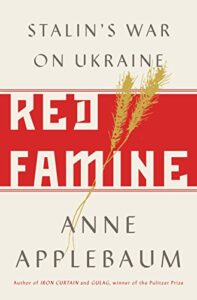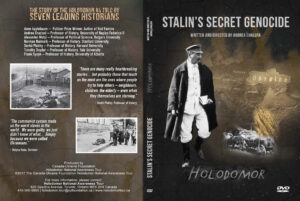 The roots of Russia’s invasion of Ukraine can be traced back to the defining event of Ukraine’s modern history: the Holodomor, or “hunger-extermination” of the 1930s, reports suggest.
The roots of Russia’s invasion of Ukraine can be traced back to the defining event of Ukraine’s modern history: the Holodomor, or “hunger-extermination” of the 1930s, reports suggest.
Today, as Ukraine battles Russian invaders and the dead again lie in the streets of places, including Mariupol, that have been cut off from supplies, memory of the famine and its links to the Kremlin remain strong, The Washington Post’s Michael E. Ruane reports.
“The famine is one of the things in the back of the heads of the Ukrainians who are fighting on the ground,” said Anne Applebaum, the author of the 2017 book “Red Famine: Stalin’s War on Ukraine.” “It’s a piece of history, and it’s remembered by Ukrainians as an attempt to eradicate” them, she said. “The awareness that they might be eradicated” again is “part of why they’re fighting now.”
Ukraine had experienced two world wars, three Holodomors, the Holocaust, Chernobyl, the Russian take over of Crimea and the war in eastern Ukraine, said Ukrainian president Volodymyr Zelensky, so “if someone thinks that, having overcome all of this, Ukrainians — any of us — will be scared, broken or willing to surrender — he knows nothing about Ukraine.”
 A Ukraine that is heading towards democratic freedom, the rule of law and integration with the West particularly galls Putin because Ukraine is ethnically Slavic and primarily Orthodox in religion, like Russia, says Stanford historian Norman Naimark. a co-author of Stalin’s Secret Genocide – Ukraine’s Holodomor. It shares the Russians’ own Soviet and Imperial past and therefore should be complicit, in Putin’s view, in Moscow’s anti-democratic ideology.
A Ukraine that is heading towards democratic freedom, the rule of law and integration with the West particularly galls Putin because Ukraine is ethnically Slavic and primarily Orthodox in religion, like Russia, says Stanford historian Norman Naimark. a co-author of Stalin’s Secret Genocide – Ukraine’s Holodomor. It shares the Russians’ own Soviet and Imperial past and therefore should be complicit, in Putin’s view, in Moscow’s anti-democratic ideology.
Kyiv City Council named a street in the Ukrainian capital “Gareth Jones Lane” in honor of the British journalist whose courageous reporting – featured in a recent film (below) – helped expose Stalin’s genocidal Ukraine famine, writes Peter Dickinson.
“The horror, the exhaustion, the inhuman indifference to life and constant exposure to the language of hatred left their mark,” wrote Applebaum, a National Endowment for Democracy (NED) board member. “Combined with the complete absence of food they also produced, in the Ukrainian countryside, a very rare form of madness.”
“Many survivors witnessed either cannibalism or, far more often, necrophagy, the consumption of corpses of people who had died of starvation,” she added.
Historian Robert Conquest told Congress in 1986, “The Soviet assault on the peasantry, and on the Ukrainian nation,” during the early 1930s “was one of the largest and most devastating events in modern history.” RTWT







